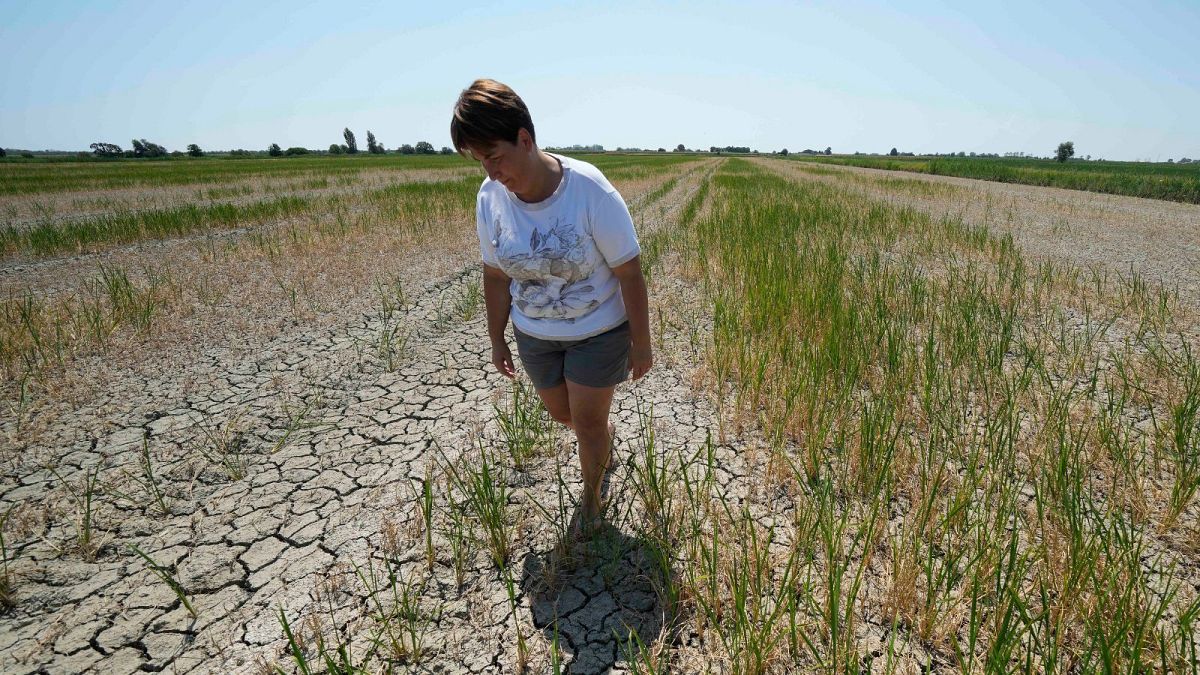In Europe, southern countries like Spain and Italy will bear the brunt of declining incomes, while Arctic-adjacent nations could benefit.
The climate crisis will reduce global income by about a fifth in the next 25 years compared to a fictional world that's not warming.
That’s according to a new study which predicts people in the world’s poorest areas and those least responsible for heating the atmosphere will take the biggest monetary hit.
Climate change’s economic bite out of incomes is already locked in at about $38 trillion (€35.6 trillion) a year by 2049, researchers at Germany's Potsdam Institute for Climate Impact Research (PIK) found. By 2100 the financial cost could hit twice what previous studies estimate.
“Our analysis shows that climate change will cause massive economic damages within the next 25 years in almost all countries around the world, also in highly-developed ones such as Germany and the US, with a projected median income reduction of 11 per cent each and France with 13 per cent,” says study co-author Leonie Wenz, a climate scientist and economist.
These damages are compared to a baseline of no climate change and are then applied against overall expected global growth in gross domestic product, explains study lead author and climate scientist Max Kotz.
So while it's 19 per cent globally less than it could have been with no climate change, in most places, income will still grow, just not as much because of warmer temperatures.
Temperature rise will cause biggest loss of income
For the past dozen years, scientists and others have been focusing on extreme weather such as heatwaves, floods, droughts and storms as having the biggest climate impact.
But when it comes to financial hit the researchers found “the overall impacts are still mainly driven by average warming, overall temperature increases,” Kotz says. It harms crops and hinders labour production.
“Those temperature increases drive the most damages in the future because they're really the most unprecedented compared to what we've experienced historically,” Kotz says.
In 2023, a record-hot year, the global average temperature was 1.35 degrees Celsius warmer than pre-industrial times, according to the US National Oceanic and Atmospheric Administration.
The globe has not had a month cooler than 20th century average since February 1979.
Where will see the biggest income drops due to climate change?
In the United States, the southeastern and southwestern states get economically pinched more than the northern ones with parts of Arizona and New Mexico taking the biggest monetary hit, according to the study.
In Europe, southern regions, including parts of Spain and Italy, get hit harder than places like Denmark or northern Germany.
Only Arctic adjacent areas - Canada, Russia, Norway, Finland and Sweden - benefit, Kotz says.
It also means countries which have historically produced fewer greenhouse gas emissions per person and are least able to financially adapt to warming weather are getting the biggest financial harms too, he adds.
The world's poorest countries will suffer 61 per cent bigger income loss than the richest ones, the study calculated.
“It underlies some of the injustice elements of climate,” Kotz says.
When will cutting emissions make a difference?
Dispiritingly, the study finds that economic harms over the next 25 years are locked in with emission cuts producing only small changes in the income reduction.
But in the second half of this century two different possible futures are simulated, showing that cutting carbon emissions now really pays off because of how the heat-trapping gases accumulate, Kotz says.
If the world could curb carbon pollution and get down to a trend that limits warming to 2 degrees Celsius - which is the upper limit of the 2015 Paris climate agreement - then the financial hit will stay around 20 per cent in global income, he adds.
But if emissions increase in a worst case scenario, the financial wallop will be closer to 60 per cent.
That shows that the public shouldn't think it's a financial “doomsday” and nothing can be done.
Still, it's worse than a 2015 study that predicted a worst case income hit of about 25 per cent by the end of the century.
How are climate-driven economic losses calculated?
Published in the journal Nature yesterday (17 April), this new study looked deeper than past research. It examined 1,600 global areas that are smaller than countries, took several climate factors into account and studied how long climate economic shocks last, Kotz says.
The study explored past economic impacts on average global domestic product per person and uses computer simulations to look into the future to come up with their detailed calculations.
Marshall Burke, the Stanford University climate economist who wrote the 2015 study, says this new research's finding that the economic damage ahead is locked in and large “makes a lot of sense.”
Burke, who wasn't part of this study, said he has some issues with some of the technical calculations “so I wouldn't put a ton of weight on their specific numerical estimates, but I think the big picture is basically right.”
The conclusions are on the high end compared to other recent studies. But since climate change goes for a long time and economic damage from higher temperatures keep compounding, they “add up to very large numbers," says University of California Davis economist and environmental studies professor Frances Moore, who wasn't part of the study.
That's why fighting climate change clearly passes economists' tests of costs versus benefits, she says.



